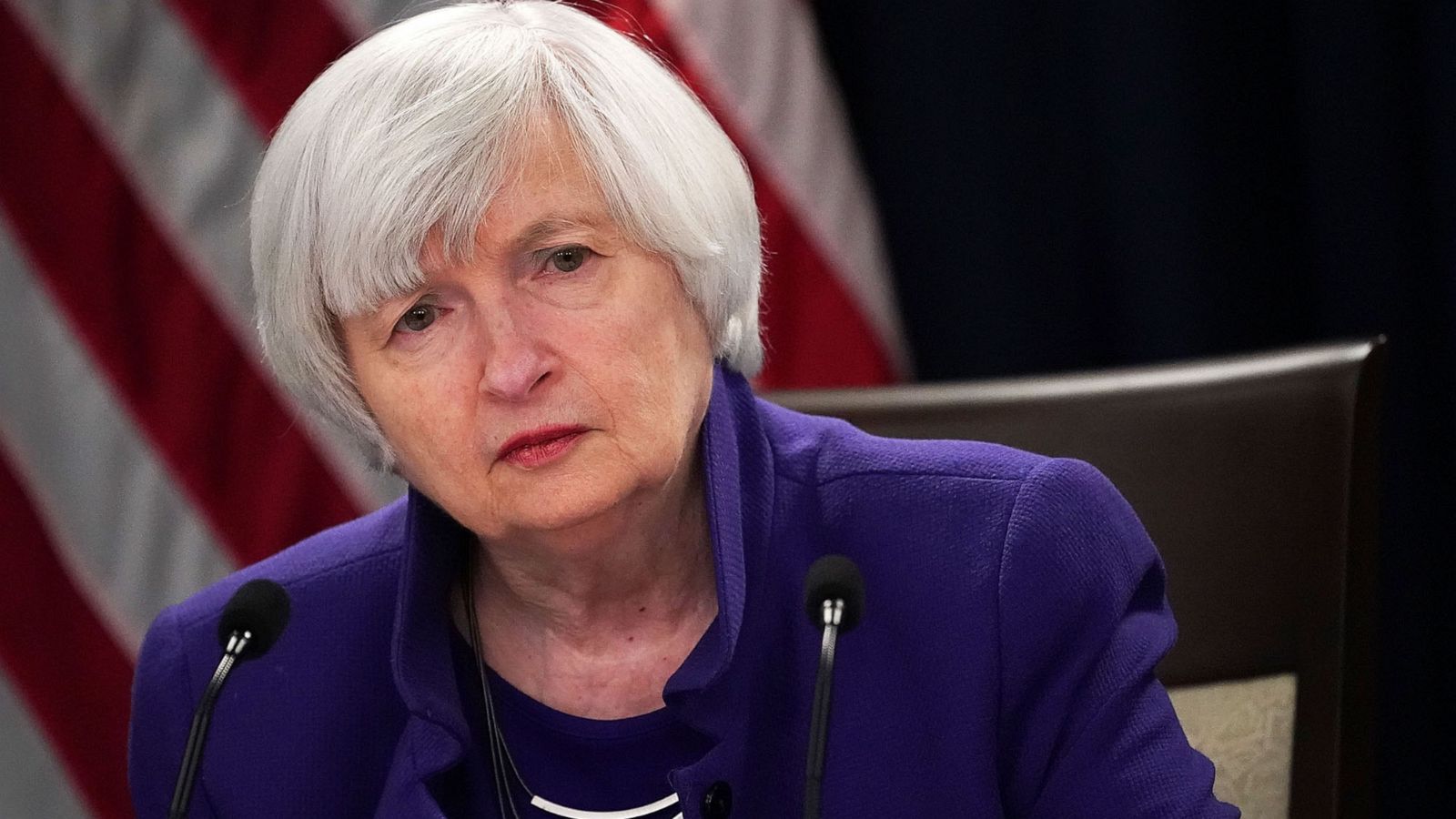Goldman Sachs analysts predict that the U.S. government is "more likely than not" to shut down later this year due to spending disagreements, which could temporarily impact economic growth by reducing it by 0.15-0.2 percentage points per week, with past shutdowns having minimal impact on equity markets.
Treasury Secretary Janet Yellen believes the US economy is on a path that will prevent a recession while maintaining control over inflation, as polls show increasing optimism among Americans; she also expects a strong labor market despite slower economic growth.
The potential government shutdown threatens to deprive the Federal Reserve of crucial data on the labor market and inflation, which could hinder its ability to make informed decisions about the economy and interest rates.
U.S. Treasury Secretary Janet Yellen sees no signs of an economic downturn but warns that failure to pass legislation to keep the government running could slow economic momentum.
U.S. Treasury Secretary Janet Yellen believes that the U.S. economy is on a path of a "soft-landing" and can withstand near-term risks, including a United Auto Workers strike, a government shutdown threat, a resumption of student loan payments, and spillovers from China's economic issues.
The White House warns that a government shutdown at the end of the month could have damaging consequences for the economy, national security, and the American public.
The Federal Reserve has paused raising interest rates and projects that the US will not experience a recession until at least 2027, citing improvement in the economy and a "very smooth landing," though there are still potential risks such as surging oil prices, an auto worker strike, and the threat of a government shutdown.
Investors shouldn't worry about a government shutdown as it is unlikely to have a significant impact on the markets.
Millions of federal employees and military personnel face the prospect of a government shutdown, which would result in financial hardships for American families, disruptions in services, and potential harm to the economy.
The impending federal shutdown, combined with other economic challenges such as rising gas prices, student loan payments, and reduced pandemic savings, is expected to strain American households and potentially weaken economic growth in the last quarter of the year.
A potential government shutdown in Washington could have far-reaching consequences, causing financial losses for millions of people, disrupting medical research and food access, delaying regulatory efforts, and hampering the Biden administration's agenda on energy, climate, and infrastructure.
President Biden warns of the potential consequences of a government shutdown, urging Republicans in Congress to take action to prevent it.
A government shutdown on October 1 is likely, but it is not expected to have a significant impact on financial markets or cause an economic recession.
Google searches about the potential government shutdown in the US are increasing, with a particular interest in how it would affect Social Security, veterans' benefits, and the US dollar.
A U.S. government shutdown would negatively impact its credit assessment and highlight the weakness of its institutional and governance strength compared to other top-rated governments, according to Moody's, although the economic impact would likely be short-lived.
There are four risks that could potentially push the US economy into a recession sooner rather than later, including a weakening labor market, headwinds for the consumer, high borrowing rates, and the rising chances of a government shutdown, according to Raymond James.
The federal government is on the verge of a shutdown, with potential consequences for various areas of governance.
A government shutdown could have dangerous consequences for the nation's cyber defenses and efforts to combat violent crime, warns Deputy Attorney General Lisa Monaco.
The impending government shutdown may have an impact on the financial markets, according to Kristina Hooper, Chief Global Market Strategist at Invesco.
The risks of a near-term recession are increasing due to potential government shutdown and strikes in the auto industry, which are weighing on consumer confidence, according to J.P. Morgan Asset Management Global Market Strategist Jack Manley.
A brief government shutdown is unlikely to significantly slow down the economy, but a prolonged shutdown could hurt growth and potentially impact President Biden's re-election prospects.
There is a 90% chance of a government shutdown, according to Goldman Sachs, as the deadline looms and little progress has been made in negotiations.
The White House has warned that the partial shutdown of the US government could hinder almost 2,000 long-term disaster recovery projects, impacting communities across the country.
The US is facing the possibility of a government shutdown as Republicans demand deep spending cuts, risking furloughs of federal workers and halting various services.
A government shutdown could lead to disruptions in food aid, air travel, and financial markets, and increase the risk of cyber attacks on critical financial infrastructure, according to Karen Petrou of Federal Financial Analytics Inc.
The summer's positive economic indicators, such as lower inflation and strong job numbers, have led to optimism that the US will avoid a recession, but factors such as a potential auto strike, the resumption of student-loan repayments, and a government shutdown could contribute to a downturn. The combined impact of these factors, along with others like higher interest rates and oil prices, suggests that a recession may be looming.
